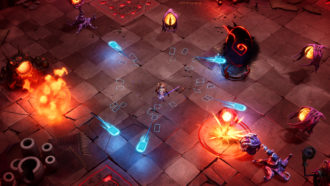Platforms:
PC, Nintendo Switch, PS5, Xbox Series X|S
Released:
June 17, 2025
Developer:
Stormteller Games
Breaking the mould and moving the series in a new direction, Lost in Random: The Eternal Die is a bold new title for the Lost in Random franchise. Moving away from structured storytelling and into roguelike territory, this sequel finds a new way to paint its creepy world.
Staying true to the captivating aesthetic of the original, The Eternal Die triumphs in visuals and atmosphere. Its Burtonesque inspirations make for a charmingly creepy adventure as the once-villain-now-hero Aleksandra battles her way through nightmarish foes and twisted games in an attempt to reach her adversary. With clear inspiration from 2020’s Hades, The Eternal Die adds a splash of stylish macabre to a solidified formula and does so to great success. Throw in some elements of chance and suddenly it’s both fate and skill that decides whether Aleksandra lives or dice.
The world is rich and lovingly detailed. The characters you encounter have vibrancy and life, with a fully voice-acted cast alongside an incredible musical score, going a long way to building up a world worth inhabiting. Like its aforementioned inspiration, The Eternal Die doesn’t throw narrative to the wayside just because of its new roguelike formula. Instead, it embraces its replayable nature, with characters commenting on your journey and the futility of your quest. You’ll build up a town of lovable characters who always have something new to say. And whilst it doesn’t hit the storytelling highs of Hades before it, the writing and dialogue still land satisfyingly to elevate the game beyond a simple action title.
“…it’s both fate and skill that decides whether Aleksandra lives or dice.”
Wielding one of four unlockable and upgradeable weapons, Aleksandra will shoot or slice her way through four biomes before reaching her final encounter against Mare – The Knight. From an isometric perspective, you’ll be dodging enemy attacks, projectiles, and environmental hazards as you land your own blows against the foe.
A standard and charged attack is on offer, as is a special ‘card’ ability that charges up during battle and can be unleashed intermittently. There’s a range of these card abilities that you’ll collect randomly as you play, from summoning tornadoes to giant rolling dice. Most of these prove to be decently impactful, though I do wish there was a bit more variety here in the utility of the cards, or perhaps even just a deeper feeling of randomness. If the effect was randomised on each use, like drawing one at a time from a shuffled deck, then the game would have found a way to both tie into the premise of the universe, whilst also providing a more engaging alternative attack.
The final tool in your arsenal is your dice companion Fortune, who, unlike the cards, feels more fully realised and meaningful. He’s a living, breathing character who can also be flung to attack foes. The damage he deals corresponds with the value rolled, and different upgrades will trigger different effects depending on that value. You also utilise him in games of chance scattered throughout a run, which further solidifies his importance.
Lost in Random: The Eternal Die feels good to play. There’s enough already here in the enemy designs, games of chance, and combat encounters to make it all worthwhile. However, the absolute cherry on top is found in the upgrade system. During each run, the player can collect runes that slot into a five-by-five grid. These runes are colour-coded, with each colour representing a certain value. For instance, red represents your attack power. Connect three red runes in a row, and suddenly you’ve boosted your attack power by 50%. Even more interestingly, each rune can have its own passive ability. Now, suddenly, you’re making choices with each new rune you pick up. Do you favour certain colours to try and get extra bonuses, or do you favour the passive abilities that would most help your build?
There’s a really good amount of variety and depth to this upgrade system, with many things to consider before making a selection. Even once the selection of a rune is made, you then need to figure out the best place to slot it into your grid. I love this amount of strategic depth because it really does put the power into the player’s hands, something that’s even more important in an experience with luck elements such as this.
“…it really does put the power into the player’s hands”
As you start progressing deeper into the game, you also start to realise just how impactful your earlier choices may be. A build that leans into conjuration, for instance, may have lighting and rockets flying around upon different interactions, which then trigger further conjured attacks to fire automatically. It’s all very satisfying and rich to watch play out.
Boss fights are engaging, and the meta progression system means you’ll always feel as though you’re advancing. Even if the first few runs are a struggle, the accumulated resources you gather will allow you to upgrade your weapons and other passive abilities so that you’re coming into the next run with extra firepower. Once that final boss is defeated, it then unlocks what is essentially harder difficulties that allow you to continue to play and advance. What’s smart is that it’s all contextualised in-universe.
Without spoilers, the ending can change depending on how far you advance in these difficulties. The game doesn’t lock you out of other endings upon your first completion either, allowing you to jump straight back into the action, complete more missions, and then check to see what your new ending provides.
8.5
Great
Positive:
- A rich and detailed Burtonesque world
- Dice companion is very well implemented
- Upgrade system is smart, deep and rewarding
- Well paced meta progression and post-ending content
Negative:
- Doesn't reach the narrative highs of its influences
- Card abilities could have been more varied and dynamic
Lost in Random: The Eternal Die is a smart sequel. It leans on the original’s strongest elements in the aesthetic and stylistic choices, whilst moving the gameplay into a new and entertaining direction. It doesn’t do anything groundbreaking, though it does succeed at producing a high-quality product that feels good to play. Thanks to an interesting upgrade system and in-built chance mechanics, The Eternal Die stands out on its own and proves to be a game absolutely worthy of your time.











